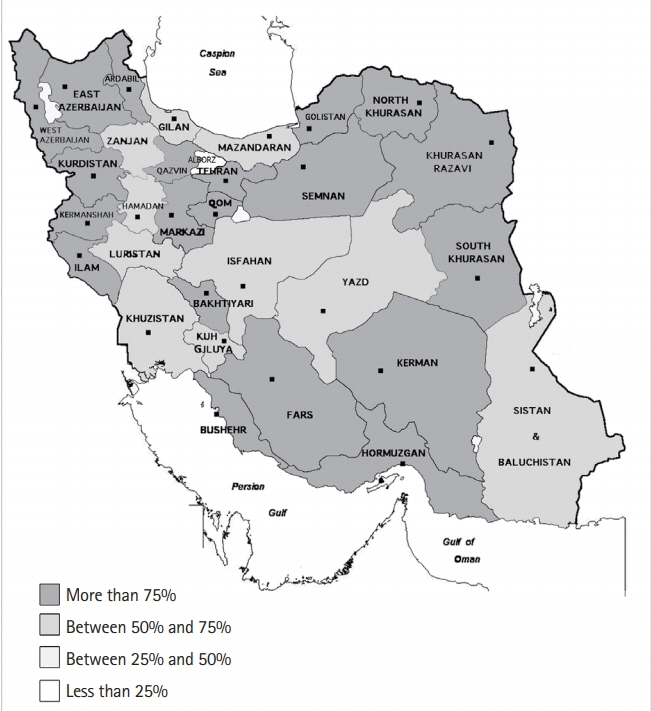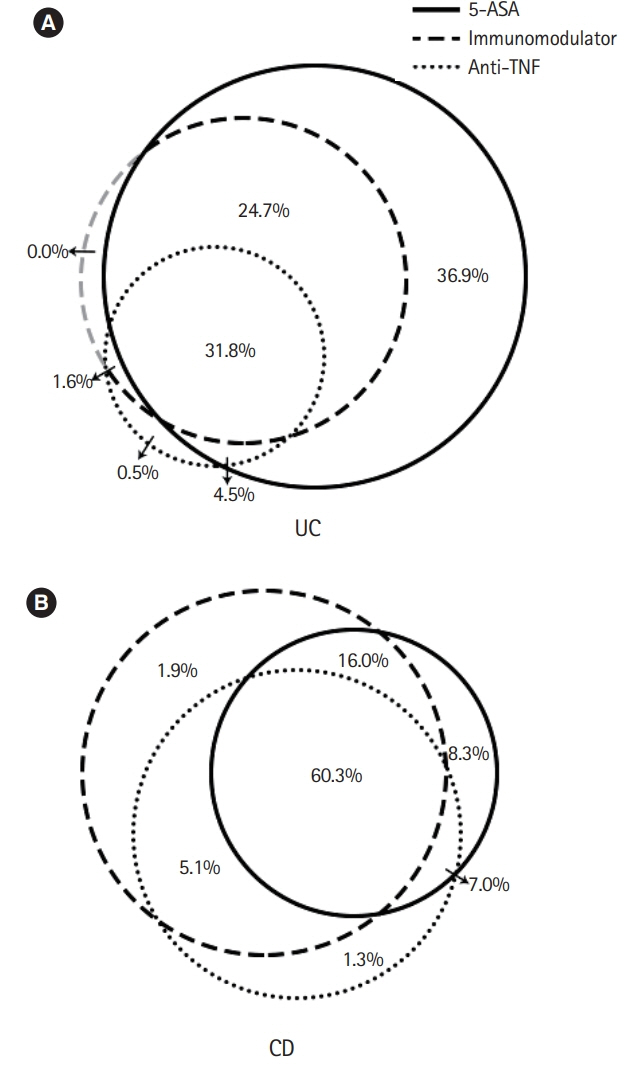Intest Res.
2019 Jul;17(3):330-339. 10.5217/ir.2018.00157.
Iranian Registry of Crohn's and Colitis: study profile of first nation-wide inflammatory bowel disease registry in Middle East
- Affiliations
-
- 1Digestive Disease Research Center, Digestive Disease Research Institute, Shariati Hospital, Tehran University of Medical Sciences, Tehran, Iran. homayoonvahedi@gmail.com
- 2Department of Gastroenterology, Imam Khomeini Hospital, Tehran University of Medical Sciences, Tehran, Iran.
- 3Gastroenterology Section, Department of Internal Medicine, Isfahan University of Medical Sciences, Isfahan, Iran.
- 4Gut and Liver Research Center, Mazandaran University of Medical Sciences, Sari, Iran.
- 5Department of Gastroenterology and Hepatology, Ghaem Hospital, Medical Faculty, Mashhad University of Medical Sciences, Mashhad, Iran.
- 6Department of Medicine, Ardabil University of Medical Science, Ardabil, Iran.
- 7Gastroenterohepatology Research Center, Shiraz University of Medical Sciences, Shiraz, Iran.
- 8Gastroenterology and Liver Diseases Research Center, Research Institute for Gastroenterology and Liver Diseases, Shahid Beheshti University of Medical Sciences, Tehran, Iran.
- 9Liver and Gastrointestinal Diseases Research Center, Tabriz University of Medical Sciences, Tabriz, Iran.
- 10Ministry of Health and Medical Education, Tehran, Iran.
- 11Cancer Research Center, Cancer Institute of Iran, Tehran University of Medical Sciences, Tehran, Iran.
- KMID: 2454741
- DOI: http://doi.org/10.5217/ir.2018.00157
Abstract
- BACKGROUND/AIMS
A recent study revealed increasing incidence and prevalence of inflammatory bowel disease (IBD) in Iran. The Iranian Registry of Crohn's and Colitis (IRCC) was designed recently to answer the needs. We reported the design, methods of data collection, and aims of IRCC in this paper.
METHODS
IRCC is a multicenter prospective registry, which is established with collaboration of more than 100 gastroenterologists from different provinces of Iran. Minimum data set for IRCC was defined according to an international consensus on standard set of outcomes for IBD. A pilot feasibility study was performed on 553 IBD patients with a web-based questionnaire. The reliability of questionnaire evaluated by Cronbach's α.
RESULTS
All sections of questionnaire had Cronbach's α of more than 0.6. In pilot study, 312 of participants (56.4%) were male and mean age was 38 years (standard deviation=12.8) and 378 patients (68.35%) had ulcerative colitis, 303 subjects (54,7%) had college education and 358 patients (64.74%) were of Fars ethnicity. We found that 68 (12.3%), 44 (7.9%), and 13 (2.3%) of participants were smokers, hookah and opium users, respectively. History of appendectomy was reported in 58 of patients (10.48%). The most common medication was 5-aminosalicylate (94.39%).
CONCLUSIONS
To the best of our knowledge, IRCC is the first national IBD registry in the Middle East and could become a reliable infrastructure for national and international research on IBD. IRCC will improve the quality of care of IBD patients and provide national information for policy makers to better plan for controlling IBD in Iran.
Keyword
MeSH Terms
Figure
Cited by 1 articles
-
Colitis and Crohn’s Foundation (India): a first nationwide inflammatory bowel disease registry
Ajit Sood, Kirandeep Kaur, Ramit Mahajan, Vandana Midha, Arshdeep Singh, Sarit Sharma, Amarender Singh Puri, Bhabhadev Goswami, Devendra Desai, C. Ganesh Pai, Kiran Peddi, Mathew Philip, Rakesh Kochhar, Sandeep Nijhawan, Shobna Bhatia, N. Sridhara Rao
Intest Res. 2021;19(2):206-216. doi: 10.5217/ir.2019.09169.
Reference
-
1. Leddin D, Tamim H, Levy AR. Decreasing incidence of inflammatory bowel disease in eastern Canada: a population database study. BMC Gastroenterol. 2014; 14:140.
Article2. Molinié F, Gower-Rousseau C, Yzet T, et al. Opposite evolution in incidence of Crohn’s disease and ulcerative colitis in Northern France (1988-1999). Gut. 2004; 53:843–848.
Article3. Loftus CG, Loftus EV Jr, Harmsen WS, et al. Update on the incidence and prevalence of Crohn’s disease and ulcerative colitis in Olmsted County, Minnesota, 1940-2000. Inflamm Bowel Dis. 2007; 13:254–261.
Article4. Ng SC, Shi HY, Hamidi N, et al. Worldwide incidence and prevalence of inflammatory bowel disease in the 21st century: a systematic review of population-based studies. Lancet. 2018; 390:2769–2778.
Article5. Prideaux L, Kamm MA, De Cruz PP, Chan FK, Ng SC. Inflammatory bowel disease in Asia: a systematic review. J Gastroenterol Hepatol. 2012; 27:1266–1280.
Article6. Lakatos L, Lakatos PL. Is the incidence and prevalence of inflammatory bowel diseases increasing in Eastern Europe? Postgrad Med J. 2006; 82:332–337.
Article7. Ouyang Q, Tandon R, Goh KL, Ooi CJ, Ogata H, Fiocchi C. The emergence of inflammatory bowel disease in the Asian Pacific region. Curr Opin Gastroenterol. 2005; 21:408–413.8. Malekzadeh MM, Vahedi H, Gohari K, et al. Emerging epidemic of inflammatory bowel disease in a middle income country: a nation-wide study from Iran. Arch Iran Med. 2016; 19:2–15.9. Leung WK. Optimization of inflammatory bowel disease cohort studies in Asia. Intest Res. 2015; 13:208–212.
Article10. Mojarrab S, Rafei A, Akhondzadeh S, Jeddian A, Jafarpour M, Zendehdel K. Diseases and health outcomes registry systems in I.R. Iran: successful initiative to improve public health programs, quality of care, and biomedical research. Arch Iran Med. 2017; 20:696–703.11. Bernstein CN. Large registry epidemiology in IBD. Inflamm Bowel Dis. 2017; 23:1941–1949.
Article12. Bernstein CN, Eliakim A, Fedail S, et al. World gastroenterology organisation global guidelines inflammatory bowel disease: update August 2015. J Clin Gastroenterol. 2016; 50:803–818.
Article13. Bodger K, Ormerod C, Shackcloth D, Harrison M; IBD Control Collaborative. Development and validation of a rapid, generic measure of disease control from the patient’s perspective: the IBD-control questionnaire. Gut. 2014; 63:1092–1102.
Article14. Clara I, Lix LM, Walker JR, et al. The Manitoba IBD Index: evidence for a new and simple indicator of IBD activity. Am J Gastroenterol. 2009; 104:1754–1763.
Article15. Kim AH, Roberts C, Feagan BG, et al. Developing a standard set of patient-centred outcomes for inflammatory bowel disease-an international, cross-disciplinary consensus. J Crohns Colitis. 2018; 12:408–418.
Article16. International Standard Classification of Education: ISCED 2011. UNESCO Digital Library Web site. https://unesdoc.unesco.org/ark:/48223/pf0000219109. Accessed March 6, 2019.17. Sangha O, Stucki G, Liang MH, Fossel AH, Katz JN. The Self-Administered Comorbidity Questionnaire: a new method to assess comorbidity for clinical and health services research. Arthritis Rheum. 2003; 49:156–163.
Article18. National Network for Research on IBD. http://www.ibd-info.ir. Accessed April 18, 2019.19. Taghavi SA, Bagheri Lankarani K, Moini M, Hamidpour L, Ardebili M, Mansoorabadi Z. Establishment of a population-based registry of inflammatory bowel diseases in Fars Province, Iran. Middle East J Dig Dis. 2012; 4:97–101.20. Sherkat R, Rostami S, Yaran M, et al. Establishment and development of the first biobank of inflammatory bowel disease, suspected to primary immunodeficiency diseases in Iran. Adv Biomed Res. 2018; 7:45.
Article21. Bergqvist D, Björck M, Säwe J, Troëng T. Randomized trials or population-based registries. Eur J Vasc Endovasc Surg. 2007; 34:253–256.
Article22. Kochar B, Long MD, Galanko J, Raffals LE, Ananthakrishnan A, Sandler RS. Inflammatory bowel disease is similar in patients with older onset and younger onset. Inflamm Bowel Dis. 2017; 23:1187–1194.
Article23. Novacek G, Weltermann A, Sobala A, et al. Inflammatory bowel disease is a risk factor for recurrent venous thromboembolism. Gastroenterology. 2010; 139:779–787.
Article24. Ng SC, Leung WK, Shi HY, et al. Epidemiology of inflammatory bowel disease from 1981 to 2014: results from a territory-wide population-based registry in Hong Kong. Inflamm Bowel Dis. 2016; 22:1954–1960.25. Zeng Z, Zhu Z, Yang Y, et al. Incidence and clinical characteristics of inflammatory bowel disease in a developed region of Guangdong Province, China: a prospective population-based study. J Gastroenterol Hepatol. 2013; 28:1148–1153.
Article26. Zhao J, Ng SC, Lei Y, et al. First prospective, population-based inflammatory bowel disease incidence study in mainland of China: the emergence of “western” disease. Inflamm Bowel Dis. 2013; 19:1839–1845.27. Cheon JH, Kim YS, Ye BD, et al. Crohn’s Disease Clinical Network and Cohort (CONNECT) Study: the first step toward nationwide multicenter research of Crohn’s disease in Korea. Intest Res. 2014; 12:173–175.
Article28. The UK IBD registry. IBD Registry Web site. https://ibdregistry.org.uk/. Accessed March 6, 2019.29. Anderson AJ, Click B, Ramos-Rivers C, et al. Development of an inflammatory bowel disease research registry derived from observational electronic health record data for comprehensive clinical phenotyping. Dig Dis Sci. 2016; 61:3236–3245.
Article30. Liu JZ, van Sommeren S, Huang H, et al. Association analyses identify 38 susceptibility loci for inflammatory bowel disease and highlight shared genetic risk across populations. Nat Genet. 2015; 47:979–986.
Article





